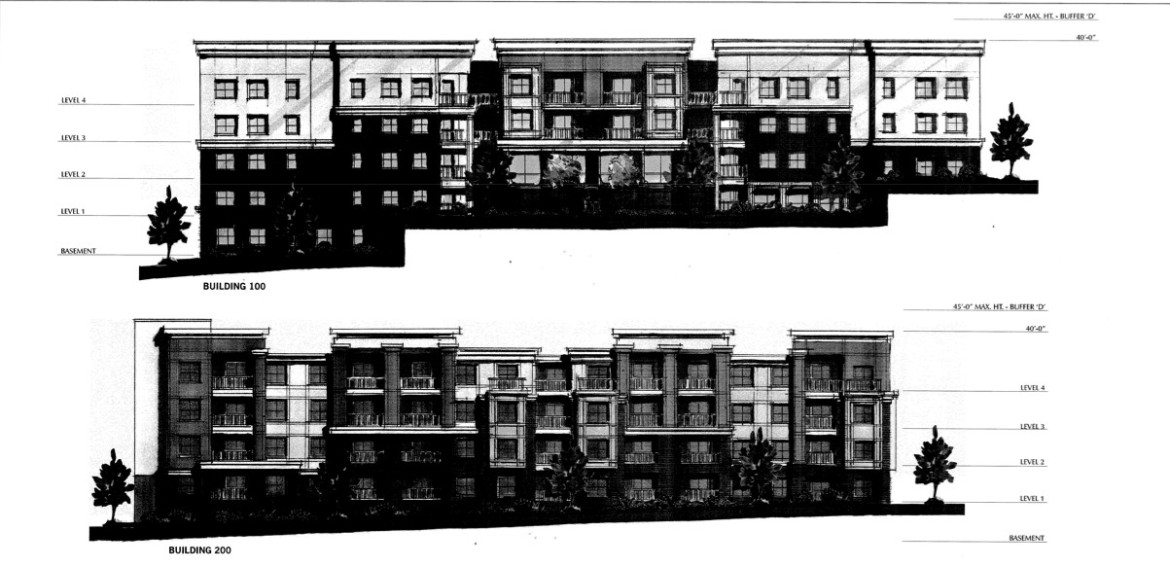It isn’t often that a neighborhood and a developer agree on so completely on something, but it happened in the case of the Jones Grant Apartments. Both the developer and neighborhood residents oppose extending a road they say will cut the development in half and increase traffic in the quiet neighborhood.
The Jones Grant Apartments is a proposed three-building apartment community of 243 one- and two-bedroom units. Building heights range from three to five stories. The complex is planned for the area near Wake Towne Drive and Wake Forest Road, just inside the Beltline.
According to city code, state-owned streets are not allowed to just end. They must either be connected or end in a cul-de-sac. Therefore, the development requires an extension of Hines Drive so it will connect to Wake Towne Drive. Hilmer Drive is also a stub street, but Hines Drive offered a better connection.
View Larger Map
Connections like this are typically made when developments come in and create an opportunity for it.
“When a street stub just ends, that’s a sign that that street is supposed to be connected,” said
Deputy Planning Director Ken Bowers.
Developer Russ Davis is not happy about cutting through the development. He said the connection is included in the site plan because the city requires it but, “in a perfect world we would have a contiguous site without that road connection.”
Raleigh Planning Commission members approved the plan this week. They cannot approve a site plan if it does not meet city code. However, Commission members encouraged area residents to appeal the case to the City Council.
Transportation planning staff said one of the primary purposes for the connection to Wake Towne Drive is to provide quicker access to emergency vehicles traveling through the neighborhood to Duke Raleigh Hospital, just north of the community.
Crabtree Heights neighborhood residents say the connection will turn their neighborhood into a cut-through for people trying to get onto Six Forks or Wake Forest roads.
Jay Mills, a resident speaking for the neighbors, said his neighborhood doesn’t have any sidewalks. Today, families can walk safely through the streets because of the limited amount of traffic. Connecting Hines Drive to Wake Towne Road would change that, he said.
Mills also referred to a set of restrictive covenants that members of the subdivision signed when they moved into the neighborhood. The covenants state that at no time will Hines Drive be extended.
“This very issue has been contractually negotiated between the owners and the homeowners,” he said. The site plan “runs directly contrary to the language that prohibits the extension of Hines Drive.”
Those covenants expire in 2014.
If the extension moves forward, Mills said it will force the neighborhood into litigation because the developer would be violating the covenants of the neighborhood.
Deputy City Attorney Ira Botvinick said restrictive covenants between two private parties become unenforceable if they conflict with city law, but the final decision lies with a court.
Bowers said the Planning Commission could require the developer to install traffic calming measures on the Hines Drive extension, but couldn’t require anything off-site.
Lacey Reaves, the attorney representing the developer, said they would be willing to put $15,000 toward traffic calming on the new part of Hines Drive.
The developer or the residents can appeal the Planning Commission’s decision to City Council. The appeal would be heard as a quasi-judicial hearing, which means all testimony relating to the traffic would have to be expert opinion. Residents would be required to hire a traffic engineer to prove a traffic impact.
“You have to have a legal basis to make an appeal,” Botvinick said. The Council would have to look at the case on a legal basis, just like the Planning Commission.
